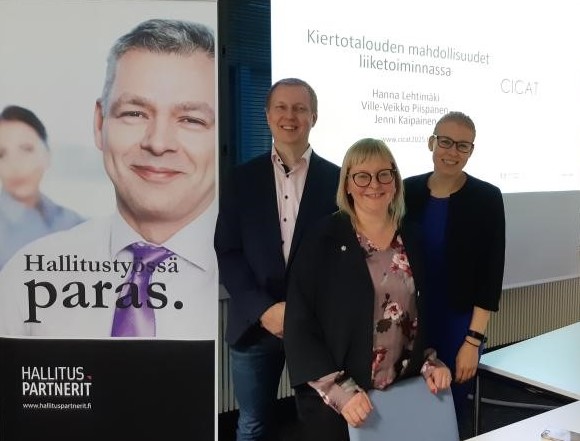Tampere University is a great place for growing into an expert of your own field – even after a master’s degree.
This is the conclusion I made after graduating with a master’s degree in Industrial Engineering and Management, and began postgraduate studies in the Center for Innovation and Technology research group. Doctoral studies usually last about four years and consist of writing a dissertation as well as completing a few postgraduate-level courses (around a third if compared with the courses needed for a master’s degree). While postgraduate studies aim for a doctoral degree, doing doctoral studies is full-time work, normally paid just like any other job.
After gathering experience over one and half years of doctoral studies, I next highlight the key benefits why you should consider doctoral studies for your future path!

Grow into an expert, and do it your own way
In doctoral studies, you choose your own topic according to what is close to your heart. The topics can be really diverse. For example, my topic is to study how companies can turn their business more sustainable and circular.
As I easily get excited about a wide variety of topics, before deciding to go for a doctoral I was worried about locking myself into one specific topic. However, this is not a problem in doctoral studies: the topics are really broad, and they develop over time as you progress with the studies.
So, in the beginning of the doctoral studies, it is enough to identify a theme and topic that is of interest to you and start looking at it with an open mind, until the topic sharpens to address the perspectives and angles that you feel the most passionate about.
In addition to the topic, doctoral studies allow flexibility in working methods. Some doctoral students are more comfortable with managing several smaller research projects simultaneously (so-called article dissertation), whereas others prefer to focus on one long research project (so-called monograph dissertation). Likewise, when carrying out the research, you get to use methods that suit your style and research topic; some enjoy dealing with numbers, while others prefer to do interviews, for example.
The so-called academic freedom is reflected not only in the choices of topic and working methods, but also in everyday work practices: As a doctoral student, you are extremely free to influence your own work schedules and location of work.
Master your skills for working life
Although doctoral studies deepen your knowledge related to your own study field, they also provide you plenty of working life skills applicable in any industry. Out of these, one of the most important skills is project management. For example, if you do an article dissertation consisting of many smaller research projects, you will develop your (multi-)project management skills by scheduling individual subprojects in a way that the overall dissertation project progresses according to the plan. Along project management skills, you will engage in strategic decision-making and, from time to time, make quick decisions to advance the sub-projects. However, not everything always goes as planned, and therefore your essential risk management skills develop in parallel with project management skills.
Research projects are often carried out together with other researchers, so teamworking skills are an essential part of doctoral studies. Because science and research know no borders, you will be able to collaborate with people from different languages and backgrounds during your doctoral studies. This will literally be the case if you move to Tampere from abroad as an international student! Thus, choosing doctoral studies will help you develop your language skills and cultural knowledge, both locally and globally.
Doctoral studies expand both your written and oral communication skills, as research results are presented not only on paper, but also as oral presentations to various stakeholders, such as companies and other researchers. Furthermore, because doctoral students often participate in the implementation of university courses, you will also learn to share your knowledge with others via teaching.
Presentation and communication skills also involve the development of sales and marketing competences because you will learn to promote your research topic to funders and partners. Importance of communication skills through doctoral studies cannot be overemphasized, as they are play a major role in various expert roles that you can take up during the doctoral path. These could include, for example, dialogue with businesses, cities, and ministries.
Extensive networks in Finland and abroad
When doing a dissertation, you create, without even noticing, extensive networks of professionals interested in the same topics and themes as you, both in the university world and in business, in Finland and abroad. In my case, despite the COVID19 pandemic, this has also been the case for example in collaborative research projects involving not only the Tampere University and researchers in universities around Finland, which I have had the chance to meet via CICAT2025 project, but also Lappeenranta University of Technology, Politechnico di Milano, Università Cattaneo, and La Salle Universitat Ramon Llull.
In addition, doctoral studies involve a lot of stakeholder cooperation, during which I have had the opportunity to for example interview inspiring leaders in pioneering circular economy and to give speeches in training events organized by Business Finland and Finnish Innovation Fund Sitra. The networks accumulated in stakeholder cooperation are strengthened and turned international through for example visits to various conferences, workshops, and seminars around the world during the doctoral studies.

Promising future career paths and salary expectations
Contrary to what one might think, engaging in academic world is just one option for your future career after dissertation. Because doctoral studies provide a wide combination of field-specific competencies as well as generic working life skills, lots of doctoral graduates end up in the business world in various expert and management positions. Furthermore, there are more and more doctoral graduates that want to put their skills into practice as an entrepreneur. For example, with this range of career options, my research topic in circular business could take me not only to academia, but also to work for the circular economy pioneer companies I have interviewed, or set up my own consulting company to advise other companies on circular economy transition.
Whatever path you choose, a positive side note is that doctoral graduate employment rate is rather high, more than 90% (Employment and salary level of doctoral graduates, Finnish Pensioners’ Federation). While the doctoral degree showcases your skills, it also helps you to justify why you would need a higher salary level.
Doctoral degree gives you a prestigious, formal recognition and proof of your expertise. Along expertise, a wide range of knowledge and skills will strengthen your career prospects. In addition, experience and networks in an international work environment give a boost to finding international jobs and creating a career abroad.
About the author






